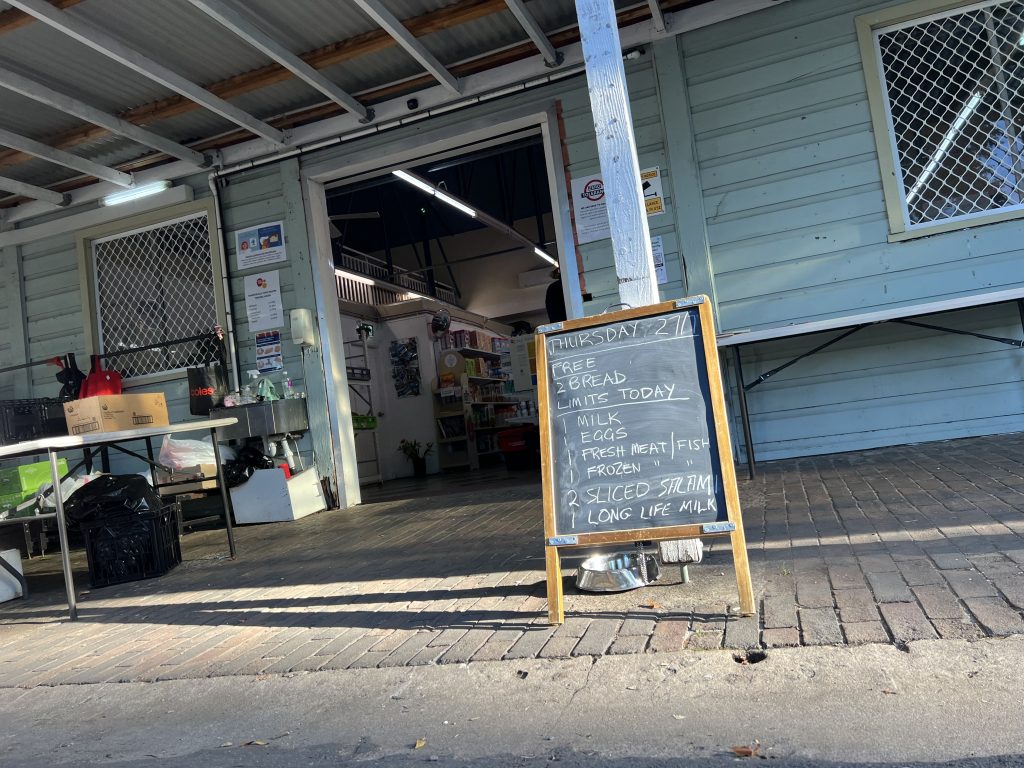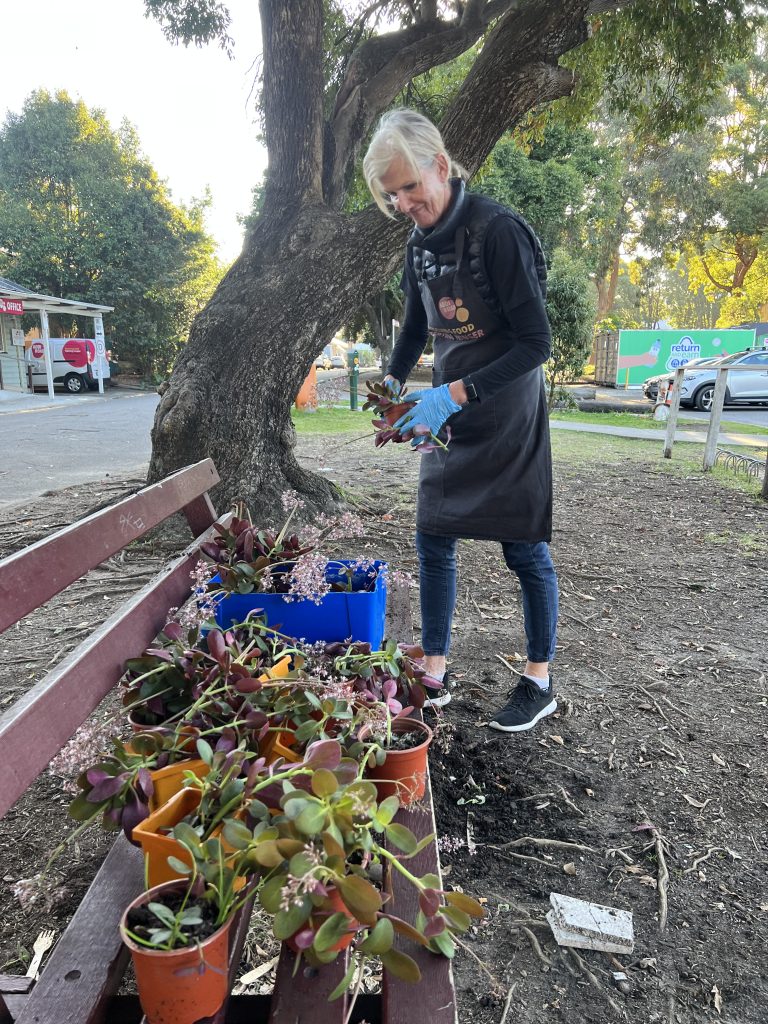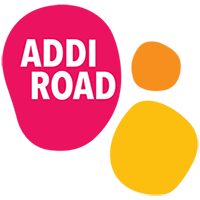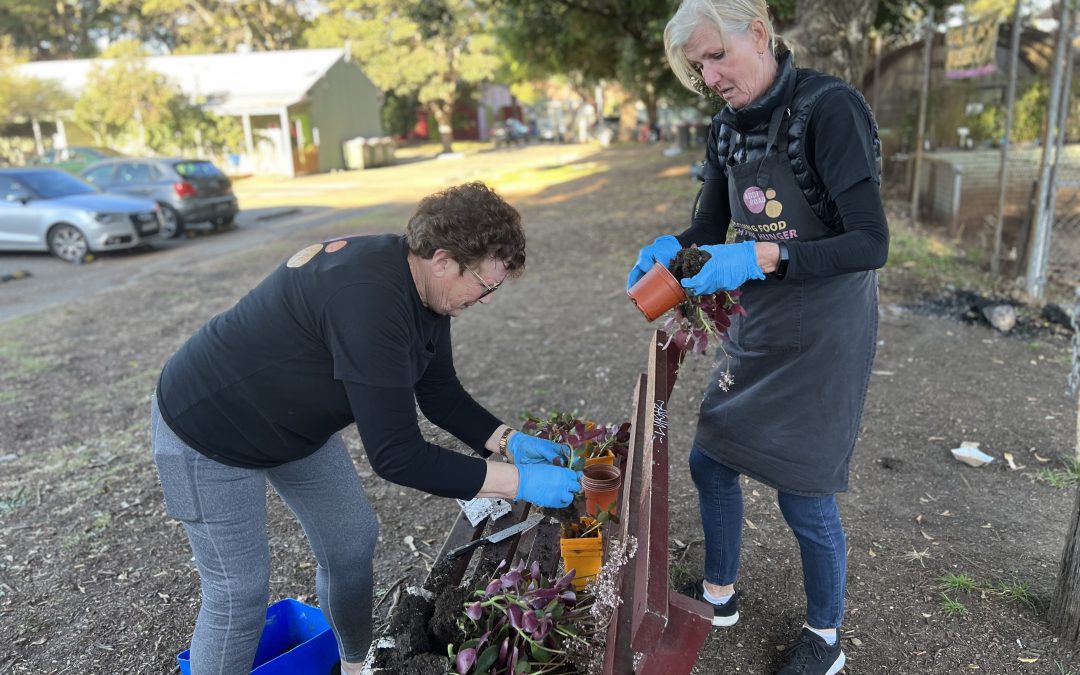One hour left till closing at the Addi Road Food Pantry. There’s just enough time to share some flowers. Two of our volunteers, Annerie and Ros, stand outside in a last splash of afternoon sunlight, making use of a bench to carve up a thick crop of purple succulents that “some nice man” has randomly donated.
They work quickly with an old butter knife to divide and replant them into a stack of small pots. Volunteers, food handlers, “gardeners, and florists!” says Annerie… the pair joke about their various talents. Ros looks up quizzically, working away at the soil and the bound roots. “You have got to be a jack of all trades here,” she says.
What kind of plants are they? “Purple ones,” says Annerie, mock-authoratively. “Can’t you just take a picture and Google it?”
When they’re done the re-potted succulents are taken back inside for customers who might appreciate them. It’s an added gift to the day and whatever they might be shopping for. A small surprise should they take a shine to them.

Addi Road Food Pantry Marrickville. Chalkboard offerings on a Thursday.
Addi Road Food Pantry operates on fairly basic principles: donated and rescued food to keep it running as a low-cost grocery store for the community, sustainable shopping that also helps the environment and reduces landfill. Spend $5 here and you will likely get triple or more of the value of what’s available at a normal supermarket – as well as free bread and a selection of free fruit-and-vegetables that varies day-to-day depending on our supplies.
Now and again, special items come in. Ice cream, nice chocolates, vegan sausages, unusual fruits, the odd fine thing you might not expect arriving out of the blue for us to share.
People sometimes envisage food rescue and food relief as a charity act that serves people and causes at only the most basic and greyest levels. At Addi Road Food Pantry Marrickville and its sister store in Camperdown the stock on the shelves ebbs and flows, depending on what’s donated and the balances we can strike purchasing additional goods. Partners and supporters are so generous and thoughtful it can be humbling; so too the various individual who volunteer and give so much to us. On good days it can feel like we are richer than we are.
Whatever the nature of that giving and receiving, a bigger principle is always being reached for. An ideal this small, random afternoon donation of succulent purple flowers captures in spirit as Annerie and Ros have divided the plants and soil with that old butterknife. This idea or feeling comes down to an attempt to offer more than just the minimal requirements of charity and concern, to work instead on a belief that people, most especially when they are struggling, warrant surprises and treats and signs of beauty, gestures they are alive in a higher place of feeling and appreciation.
Task completed, Annerie returns to the bench and sweeps it clean of dirt with her blue-gloved hand. People like to sit and talk here, before and after shopping, sometimes deep into the afternoon. A few broken petals sit on the ground. But most of the succulents have been saved, cherished and admired. People enter the food pantry for groceries and bread to get by as usual. Some take away a tiny pot of flowers to brighten their home and the day.

Annerie of Flowers at Addi Road
And now, an old poem, an old song….
BREAD AND ROSES
“Bread and Roses” is a political slogan as well as the name of an associated poem and song. It originated from a speech given by American women’s suffrage activist Helen Todd; a line in that speech about “bread for all, and roses too” inspired the title of the poem Bread and Roses by James Oppenheim. The poem was first published in The American Magazine in December 1911, with the attribution line “‘Bread for all, and Roses, too’—a slogan of the women in the West.” The poem has been translated into other languages and has been set to music by at least three composers.
The phrase is commonly associated with the textile strike in Lawrence, Massachusetts between January and March 1912, now often referred to as the “Bread and Roses strike”. The slogan pairing bread and roses, appealing for both fair wages and dignified conditions, found resonance as transcending “the sometimes tedious struggles for marginal economic advances” in the “light of labor struggles as based on striving for dignity and respect”, as Robert J. S. Ross wrote in 2013.
The legacy of the poem and the song continues to be felt as one of the great anthems of feminist struggle and social justice.
Information about ‘Bread and Roses’ sourced from Wikipedia.

